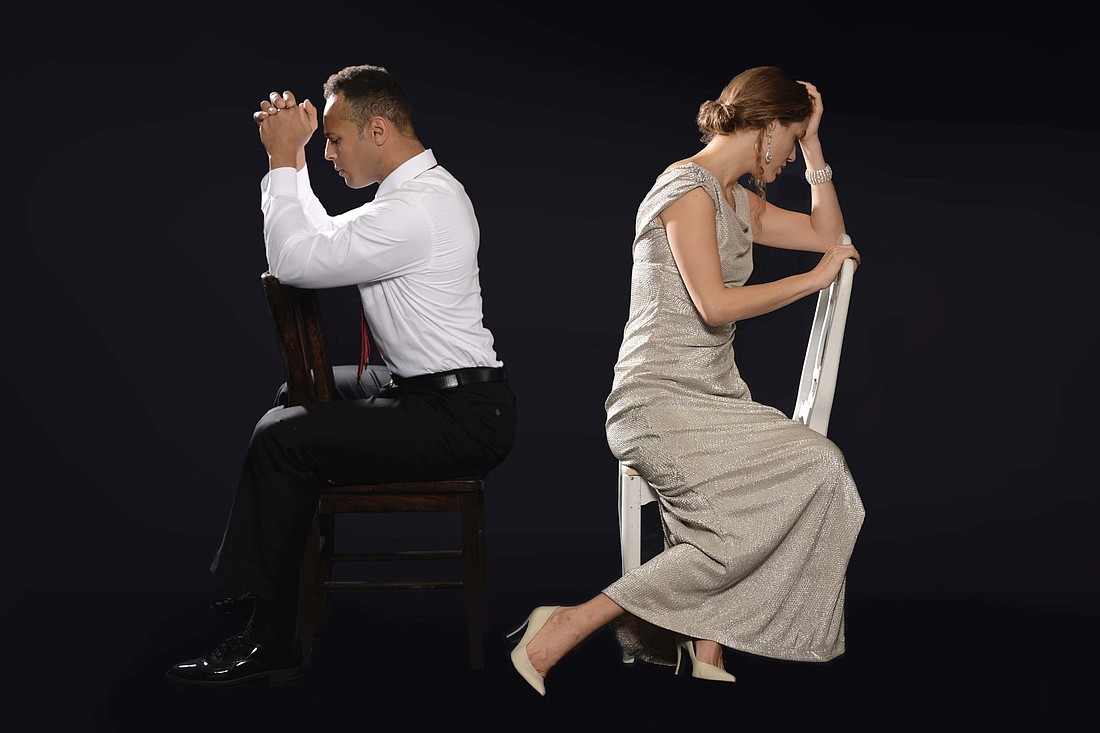- July 4, 2025
-
-
Loading

Loading

“Oedipus” is known as the Greek play about the king who unknowingly kills his father and marries his mother (and don’t forget the gory depiction of vision loss).
No, that’s not a spoiler, because he does both of these things after an oracle prophesied that he would.
But Oedipus is more than a tragic hero. He’s an example of what can happen to humankind when it abuses power. And the FSU/Asolo Conservatory for Actor Training team staging the play thinks this message is more important than ever.
“It’s a play about power and the responsibilities of power and the weight of that responsibility,” says Director Greg Leaming. “That applies to any time period. Particularly now when so many of us are focused on political attitudes and are concerned with the people we empower.”
But Leaming says as he started rehearsals, it became apparent that “Oedipus” is also a play about faith and exploring what it means to have faith when you’re faced with crisis.
All 12 second-year students at the Asolo Conservatory get to explore this theme in the production, which will be their first time performing on stage since starting the graduate program.
Work began last May when the show was casted before students left for summer vacation. They were given the break to memorize their scripts, and when classes started again this fall, rehearsals began right away.
Andrew Hardaway plays the role of Oedipus, which is a thrill for an actor whose favorite genre of theater is Greek plays. But portraying a character as complex as Oedipus has also been an interesting challenge.
“In Oedipus it’s this feeling of newness to the crown, threat to his crown, and how that lends itself to his fear and paranoia,” he says. “A challenge, too, is you don’t want to make it soap opera-y
— you want to hold onto this idea of faith dividing a city state. That’s very potent.”
He says the play is at risk of being melodramatic because of the actions Oedipus unknowingly takes in regard to his parents, but if actors remember the story is about power and faith, and how the two contribute to both the success and downfalls of a society, it can speak to whoever is watching.
Leaming says the play is a challenge for the students because of the deep psychological foundation of the story and the intricacy of its characters. The actors also have to work with music and unique voice techniques, offering them the chance to showcase their skills and develop as actors, which will help next year when they’re full-time Asolo Rep company members as part of their third year in the program.
Because it is a difficult text, Hardaway says he’s thankful his class did an analysis of the play during its first year of the graduate program. Through their schoolwork, they laid out the foundation of the story by writing a paper analyzing “Oedipus” through the six Aristotelian elements of plot.
It was then, he says, that they became engrossed in the play.
Student DeAnna Wright plays the priest and chorus leader, and she is grateful for not only the “Oedipus” background knowledge she had going in, but the way that Leaming decided to portray this classic tale written about 2,500 years ago.
Instead of wearing the cream-colored robes and olive leaf branch accents that come to mind when thinking of traditional ancient Grecian garb, the actors will wear contemporary clothes for the show. This was intentional because Leaming wants to highlight the similarities between this classic story and the current American political climate, so the clothes bridge the gap between.
“The two worlds are amazingly parallel,” Wright says. “Our country is pretty much being destroyed by having such a flawed leader, and Oedipus is the same, his flaws are what’s destroying Thebes.”
When Wright compares the two leaders, she sees self-centeredness as a weakness. She sees men who point fingers at others instead of taking the blame, and this inability to handle criticism is explored in the play.
Hardaway takes this one step further. He builds on Leaming’s opinion that the play is really about faith.
“Faith is this belief that people have, yet there’s no truth, you just believe, and when that’s challenged, it can be very crippling — but in some instances it can be liberating,” he says.
He says Oedipus is constantly teetering on that line with his faith. Sometimes he’s liberated and other times he’s had the rug pulled out from under him, and that struggle of faith is potentially the most moving aspect of the work.
Hardaway doesn’t like comparing this role to previous characters he’s played because he feels like he’s in a completely different space now, but he does feel like he had more of an opportunity to mold this character than in other productions in which he’s acted.
“In some cases in the past I’ve felt more like a puppet — capable but not in tune with what I need to be with in terms of the production,” he says. “Now I feel more in tune with being a creator.”
When it came time to act as creator, he says the most important steps were studying the role and keeping an open mind to the director’s vision without compromising his own. This way, they found a “happy marriage” between the two.
Leaming guesses about 90% of Sarasotans have never seen “Oedipus,” so he’s excited to expose theatergoers to the vision he created with his actors.
“It’s the kind of theater you’ll never see anywhere else, and it’s a really great story told beautifully,” he says.
Wright looks forward to the performance, but she’s most excited to learn how audience members connect “Oedipus” to contemporary societal issues.
“It’ll be interesting to see the response and who’s willing to open their eyes to our contemporary societal issues.”